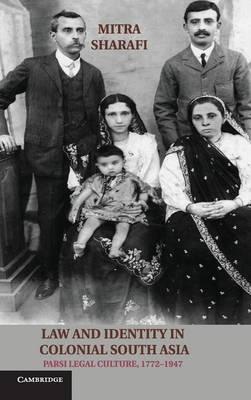Awards
- Winner of J. Willard Hurst Award, Law and Society Association 2015
- Winner of James Willard Hurst Prize of the Law and Society Association 2015
- Winner of James Willard Hurst Prize of the Law and Society Association 2015.
Overview
This book explores the legal culture of the Parsis, or Zoroastrians, an ethnoreligious community unusually invested in the colonial legal system of British India and Burma. Rather than trying to maintain collective autonomy and integrity by avoiding interaction with the state, the Parsis sank deep into the colonial legal system itself. From the late eighteenth century until India's independence in 1947, they became heavy users of colonial law, acting as lawyers, judges, litigants, lobbyists, and legislators. They de-Anglicized the law that governed them and enshrined in law their own distinctive models of the family and community by two routes: frequent intra-group litigation often managed by Parsi legal professionals in the areas of marriage, inheritance, religious trusts, and libel, and the creation of legislation that would become Parsi personal law. Other South Asian communities also turned to law, but none seem to have done so earlier or in more pronounced ways than the Parsis.
Full Product Details
Author: Mitra Sharafi (University of Wisconsin, Madison)
Publisher: Cambridge University Press
Imprint: Cambridge University Press
Dimensions:
Width: 15.20cm
, Height: 2.40cm
, Length: 22.90cm
Weight: 0.610kg
ISBN: 9781107047976
ISBN 10: 1107047978
Pages: 368
Publication Date: 21 April 2014
Audience:
Professional and scholarly
,
Professional and scholarly
,
Professional & Vocational
,
Professional & Vocational
Format: Hardback
Publisher's Status: Active
Availability: Manufactured on demand

We will order this item for you from a manufactured on demand supplier.
Reviews
Advance praise: 'Despite its importance, there is relatively little written on Parsi law. Mitra Sharafi's book undertakes the most detailed and informed study of the main branches of Parsi legal history. In it, Sharafi neatly straddles two readerships, the Parsi specialist and the legal fields. Through this, Sharafi offers a work that is by a long way the best study in its field, carrying the subject a long way forward. This is a superb piece of work.' John R. Hinnells, Liverpool Hope University Advance praise: 'Mitra Sharafi's book brings to light a community that has received little attention in the historiography of South Asia, namely the Parsis. What distinguishes this community is the unique path by which they acculturated themselves into the world of colonial law, both by entering the legal profession and by crafting their own laws of marriage and inheritance. Sharafi moves deftly between Parsi cultural issues and their participation in colonial courts, both as litigants and as practitioners of colonial law. Her command over the local case law concerning Parsis, relevant newspapers, and records of London's Privy Council are nothing short of breathtaking. This is clearly the work of a dedicated scholar, and this book will make a strong contribution to South Asian history and the study of diaspora and of colonial law more broadly.' Chandra Mallampalli, Westmont College
Author Information
Mitra Sharafi is a legal historian of South Asia. She is Associate Professor of Law and Legal Studies at the University of Wisconsin, Madison, with History affiliation. She hosts the South Asian Legal History Resources website.




